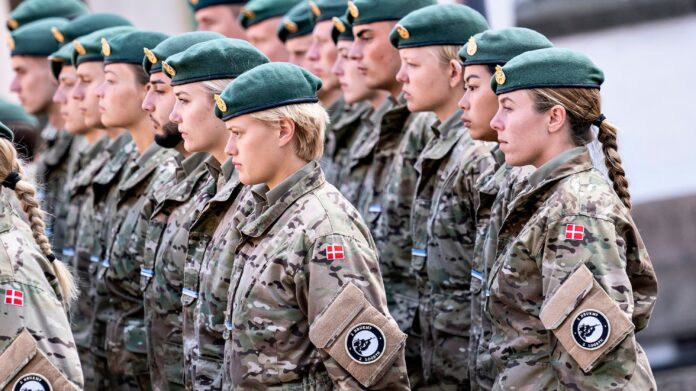This is a small kingdom long frozen in its postcard images of hygge, bike lanes, a reassuring monarch and the soft murmur of social consensus. Yet since July 1st, Denmark has chosen a rougher face: that of a mandatory conscription in Denmark which, under the convenient pretext of deterring Moscow, now enrols its freshly adult women. Many praise it, chanting the mantra of equality. But for anyone with an ear for weak signals, this extension to women betrays an unease gnawing at the Nordic order, a fear of its own fragility more than a real Russian juggernaut on the doorstep.
The “Forsvarets Dag”: a Nordic ritual under quiet strain
Few rituals say more about Denmark’s quiet militarisation than the so-called Forsvarets Dag, the “Day of Defence”. Every Dane turning eighteen, and now every young Danish woman, is summoned to undergo a battery of tests: medical check-ups, psychometric quizzes, a bland “motivation” interview that masks its true purpose, selecting tomorrow’s rank-and-file for an army sold as citizen-friendly.
Until now, Danish women could volunteer, and in fact made up 24% of new recruits in 2024, the highest share in Europe, rivalled only by Norway. Now, they’re no longer the exception but part of the norm, drawn into the national lottery for compulsory service.
And all this under the smiling varnish of “modern equality”. Scratch that paint, and you see the same primal fear: Russia, the useful spectre lurking just across the Baltic. It serves, as always, as a moral lever for ramping up budgets and forging a new collective backbone.
The NATO effect: parity as a tool for expansion
Here is the real arithmetic behind this polite mobilisation: official figures show the government aims for a 40% boost in recruits by 2033. They’ve quietly stretched the service length from four to eleven months by 2026, and the mandatory conscription in Denmark will churn out the needed warm bodies. Who stands to gain from this? Not the Danish taxpayer, but certainly NATO, which is delighted to see its northern flank bristle with more uniformed youth, without committing too many American boots to the ground.
The trick is to normalise it by increments: today a few thousand young women enrolled; tomorrow, a fully interchangeable conscript army, male or female, whose main guarantee is that its deterrence will never be put to the test unless catastrophe strikes.
The generals and politicians keep the signs discreet. A closed airspace here, a drone intercepted there. A subtle bump in the defence budget. No big speeches. Just the comforting notion that, because we mobilise everyone equally, we must be ready for anything.
Feminist arguments as a recruitment shield
Most revealing is the feminist veneer applied to the whole scheme. Ministers beam on camera, praising equal duties. Off the record, the brass admits what many suspect: Denmark’s young men alone aren’t enough anymore. Too individualistic, too well-educated, too reluctant to endure eleven months of drills and chain-of-command monotony. Egalitarianism thus becomes the perfect rhetorical tool to plug the recruitment gap without saying the quiet part out loud: we need more bodies, period.
Critics, so far scattered, point out that Norway opened this door years ago. But Denmark pushes it further: the mandatory conscription in Denmark no longer sees women as occasional volunteers but as the same raw material as men. An army reborn as a civic duty for all, an equal share in a national anxiety that dares not speak its name.
And the quiet winners? Not the families, who watch their daughters step into an institution once reserved for sons. But the arms suppliers, the Atlantic strategists, and a Parliament faction convinced this is the ticket to greater respect in NATO’s inner circle.
The weak signals that no one listens to
Anyone watching closely will see the dots connecting. A spike in Russian reconnaissance flights over the Baltic; discreet upgrades to airbases; joint exercises with the British, each flaunted as proof that the bear is at the gate. Yet no minister risks putting a percentage on the odds of a real attack on Danish soil. That uncertainty is, in fact, convenient, an elastic threat that justifies swelling ranks and budgets while the public stays docile, comforted by the sight of its king at military parades and the illusion of control.
Meanwhile, the Anglo-American bloc gives polite nods: Washington applauds Denmark’s “leadership”; London hints that others should copy it. A calm kingdom sleepwalks toward a posture that risks outgrowing its real strategic value.
A scent of Cold War, in pastel colours
This is the contradiction at the heart of the mandatory conscription in Denmark: the return of an old Cold War reflex, sugar-coated in modern egalitarian pastel. The army once again becomes an academy of civics, a lab for national cohesion, a social glue for a generation said to have grown too individualistic. It is tempting, almost nostalgic, to see unity forged in the barracks.
But history is merciless. Conscript armies once held the line, until they collapsed at the first taste of real asymmetrical warfare. One wonders what illusions today’s young Danes harbour when they draw that number at the Defence Day lottery.
Conclusion: uniformed equality is fear in disguise
In the end, the prettiest PR line, that Denmark is now more equal than ever, hides a starker truth: egalitarianism in uniform is still uniformity, and the real driver is fear. Fear of an unpredictable Moscow. Fear of being caught short-handed. Fear of losing that warm NATO embrace if the kingdom is seen to lag behind.
Under the polite chatter of “modernising defence”, Denmark is locking an entire generation, male and female alike, into a bargain that may never be tested, except by a crisis few in Copenhagen dare imagine. It is an illusion of order, built on the promise that the next lottery will always pick someone else’s child.



